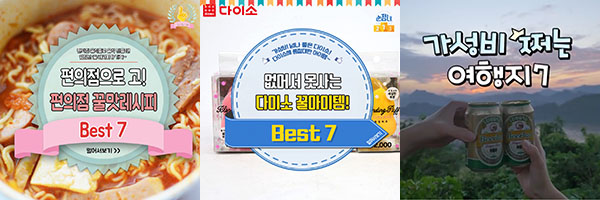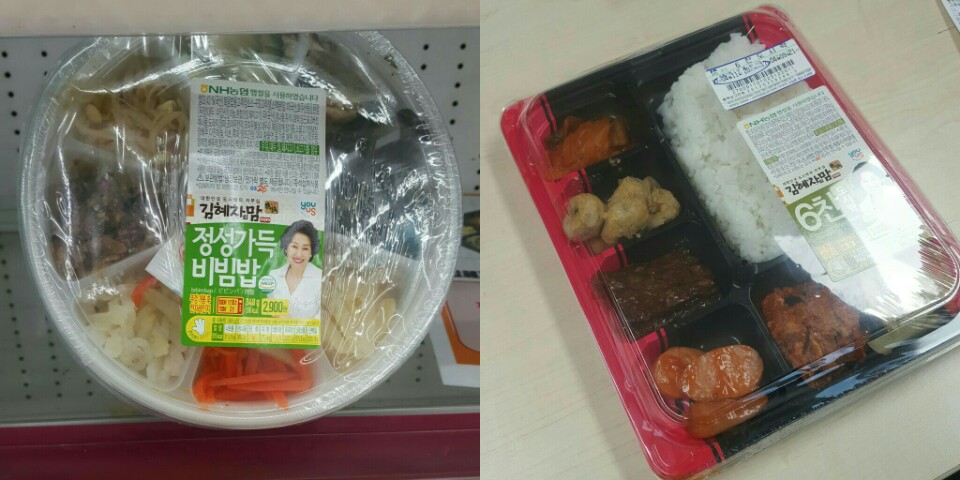
All over the city are doll-grabbing crane game shops and coin-operated singing rooms. On your SNS news feeds, there are adverts for ‘7 Convenience Store Dishes – with recipes’, ‘7 Must-Have Items in Daiso’, and ‘7 Cost-Effective Travel Sites’. Compared to just 10 years ago, when people once valued a well-being lifestyle and paid close attention to what they ate, cost-effectiveness is now the norm in society. From a social consciousness of well-being to a life of convenience, cost-effectiveness, and doll-grabbing games, the change in today’s twenties is clear: cheaper and unhealthier.

PHOTOS BY KMJ
There are 2 coin-operated singing rooms and 3 doll-grabbing crane game shops
in front of Sookmyung
Poverty Makes Cheaper and Unhealthier
Recall just 10 years ago when the trend was for everything to be “well-being” connected. The media was constantly airing and discussing the importance of organic food, people paid attention to their eating habits, and shoppers sought out good quality expensive products. The 2016 trend analysis by the Ministry of Culture, Sports, and Tourism shows a very different Korea. According to the report, ‘cost-effectiveness’ has become the keyword in consumption for 2016. People first look to cost-effectiveness when making long-term usage product purchases such as electronics, but now it is the first aspect looked at when purchasing. Hobbies have also changed over time. With increases in living alone, people spend less on individual activities, preferring instead to enjoy “small” play. There has been a dramatic increase in the number of doll-grabbing crane game shops, a product of this phenomenon. According to the Game Rating and Administration Committee, while only 21 doll-grabbing crane game shops existed in 2015, there were 157 in August, 415 in October, and 500 in December of 2016.
The increase in popularity of these types of shops seems to arise from the lack of extra money. Less and less young people are finding employment and they are simply fed up with the unemployment situation. In recent years, the Korean unemployment rate has continued to surpass its low each year. The Sookmyung Times has covered this environment regularly over the years as well. In addition to the lack of available employment positions, there is the problem of poor quality jobs. According to Hyundai Economy Institute, only 3 of 10 workers (6,740,000 of 19,310,000 people or 34.9%) are permanent employees, and the average earned salary is only 2,250,000 won/per month. Moreover, the percentage of people in their twenties holding full-time positions was only 3.3% in 2015. Jeong Eungi, Electronics Convergence Engineering’ 17 at Kwangwoon University, said, “For people in their twenties and most university students, the doll-grabbing crane game and the coin-operated singing room, because they are relatively less of a financial burden than other activities, are attracting huge numbers.” That is, people in their twenties who have yet to find a job or who have low-paying employment positions now seek “play” that does not require lots of money and unnecessary consumption. Instead of expensive organic food and spending time and money on possessions and activities, young people today are satisfied with unhealthy instant food and cheaper hobbies. Less money has resulted in purchases of poorer taste.

Like a Tiger Moth Drawn To the Flame
People in their twenties are enjoying cheaper unhealthy food and activities like a tiger moth drawn to a flame. Just like the moth that gains nothing but a quick death, young people are degrading their quality of life. Ji Juhyung, sociology professor at Kyungnam University, said, “The convenient bestselling lunch box at convenience stores is incredibly high in sodium. It’s something to think about whether companies hide this fact behind the word ‘cost-effectiveness’.”1) Convenience store lunch boxes are popular among young people for their price and convenience, but they are mirrors into the reality that their quality of life has declined. Young people feel the need to eat faster due to the pressures of time.
The second reason for this recent trend is short boughs happiness. At a single moment in time, a young person in their twenties feels happy enjoying a savory and salty food item, which was easily bought with little expenditure. Son Younghwa, psychology professor at Gyemyung University said, “People have deluded themselves into the pretense that the more lose their money, the bigger the payoff. Playing the doll-grabbing crane game is one such example of this notion. Social unrest such as unemployment has caused people in their twenties to be attracted to something gained easily like the doll-grabbing crane game.”2) Today’s trend for brief boughs of happiness will not lead the generation to success, for they only seek immediate gratification. They live daily by pursuing happiness that is close at hand.

The Search for a Better Life

Current life trends need altering. To accomplish this, improvements are needed in the work environment, both in quantity and quality. The main cause for young people in their twenties to seek unhealthy, quick, short boughs of happiness seems to be the fact they do not have the funds to purchase anything of higher quality as they see these purchases as extravagant. Job–sharing by shortening working hours will guarantee appropriate wages to all and create a stable working environment. Current presidential race candidates have raised various platforms on the issue. Ahn Cheolsu, the People Party, has suggested policy that regulates minimum wage, and Moon Jaein from The Minjoo Party also promises to raise minimum wage. Korean Labor Institute Researcher Bae Gyusik claims that only through financial reassignment will the job market and workers’ welfare improve.3) In other words, this type of political campaigning and administrative agenda is necessary.
There is also a need for community safety nets to be established. Lee Sangi, co-representative of Welfare State, said, “With community safety nets like free tuition and housing subsidies, people in their twenties would feel less burdened. Their living expenditures would decrease dramatically and they could afford a decent standard of living even though their salary would not be huge.”4) In other words, community safety nets help ease the financial crunch people in their twenties feel, and they would not have to obsess over money and afford to purchase or do things they want. To raise their standard of living and degree of happiness, young people should observe carefully government’s policy implementation from beginning to end.
A Society that Accepts Personal Taste
In February, a news article aroused public sympathy. The headline was ‘We don’t have much time or money to waste’ (http://slownews.kr/61461). Briefly, the article focused on consumer consumption choice. In particular, it looked at how most people typically buy the same snack, nail polish, book, etc. over and over because we are afraid to “fail” when purchasing something new or unfamiliar. People don’t have much time and money to waste, so they give up their personal taste. This society where taste is considered as extravagance is not good. After this election, this reporter hopes the society will accept personal taste.
1) Woo Bora, “Two Views of Cost-Effectiveness”, Kyungnamdomin Ilbo, February 8, 2017
2) Lee Gyungmin, “Doll-Grabbing Crane Game Addiction by Youth... It Is Similar to Gambling and Game Addiction”, Chosun Ilbo, January 20, 2017
3) Choi Hyejoung, “Employment Extension vs. Quality Improvement...”Job, Hankyoreh, February 21, 2017
4) Kim Sunjae, “Doll-Grabbing Crane Game is An Extravagance? The Sad Reality of Tangjin Jam (Squandering)”, Meconomy, February 1, 2017


